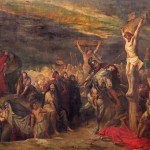As we now turn a corner during the season of Lent, we begin to look towards the climactic end of Good Friday and Resurrection Sunday. Each year as we approach this season, I find myself rethinking the cross.
Not whether or not it happened, but rethinking the significance.
As the years have gone by and I have processed this in my own journey, I have come to believe that rethinking the cross– reexamining our atonement theology– might be one of the most important things we can do for our faith. Here’s a few reasons why:
The cross is at the heart of the Gospel
The climactic moment in all of human history took place over the course of a weekend a few thousand years ago. For Christians, regardless of whether we are conservative or liberal, protestant, Catholic, or whatever, the cross is at the heart of the Gospel.
It’s why we hang crosses around our neck, and put them in our churches—it’s as if we all intrinsically realize, regardless of our differences in theology, that this moment was the moment.
Whatever happened on that cross— whether we accurately understand it or not, is at the very core of the Christian story. All other reasons aside, this one reason should strongly to compel us to reexamine what we think and believe about the cross, because whatever happened on that cross is the entire foundation we are building our faith on.
The image we have of God is often defined by our atonement theology.
If then, the cross is the defining moment of human history and the foundation of all Christian faith, we should also recognize that how we view the cross and the atonement dramatically influences how we see (and what we think of) God.
One could say that the cross reveals who God is, and what God does—essentially; the cross reveals God’s character in its purest, most visible form.
Thus, the character of God we think we see on the cross becomes our foundation of understanding who God is.
Is God one who demanded a blood sacrifice to satisfy his wrath? Is God Jesus on the cross, loving and forgiving his enemies?
How we answer these questions will define, in our own minds, who God is. Surely then, we should revisit this and make sure we’re asking the right questions and arriving at right answers, no?
Seeing the true identity and character of God depends on these questions and answers—so we must not be afraid in asking them.
Our view of the atonement influences our entire understanding of Scripture
If the cross is the climactic moment in God’s story, if it reveals the true character and nature of God, and if it becomes the foundational view that drives the rest of our beliefs about God, then it would also be true that how we view the atonement will also dramatically influence how we read Scripture.
How we view the cross influences how we interpret all of the events leading up to it.
How we view the cross influences how we interpret all of the events after it.
To be perfectly honest, how we view the cross influences our view of every part of God’s story.
If there were ever a theology or doctrine to question– not for the sake of questioning itself, but for the sake of getting it right– this is the theology to question.
…
For the vast majority of us, I think it would be safe to say that we grew up with a very specific version of the cross—one that is commonly called “penal substitution.” In this view, the cross is a symbol of God’s wrath against sin, and is the place where God brutally punished his own son in our place. Since a totally innocent person was killed in our place, so the theology goes, the rest of us can be set free and reconciled to God.
While for many of us this version of the cross was just assumed to be true and never questioned, I believe it is worth questioning—for the three reasons I articulated above.
For me, this version of the cross invites questions—hard questions. Questions like:
- Why would God demand a blood sacrifice?
- Why is God unable to simply forgive us, without blood to satisfy him?
- Is it just to execute an innocent person to spare the guilty? How does that even work?
- Why is it that our understanding of the cross seems so comparable to medieval concepts of justice?
- If the cross was a payment, who was being paid off? Was it even God?
- Is there a better view than the one we grew up with?
I’m sure this version of the cross invites more questions, but these are certainly some questions this theology invites for me—questions that have the ability to influence our faith from the foundation up.
When I was growing up, the rightness of this view was so assumed that I never thought to even question it—but now, I am.
If this is going to influence our understanding of God, of the Gospel, and drive how we read Scripture, I think we owe it to our faith to question this, and to explore the answers– wherever they lead.
This is precisely what I’ll be doing on the blog over the the next few weeks, as we begin to look toward Good Friday and Easter. If you have questions about the atonement you’d like to see answered, ask them in the comments or on Facebook, and maybe your question will become part of the series.
In the meantime, give yourself permission to question this doctrine—because your understanding of God, the Gospel, and how you read Scripture, is riding on it.
…
Stay up-to-date! Follow BLC on Facebook:













